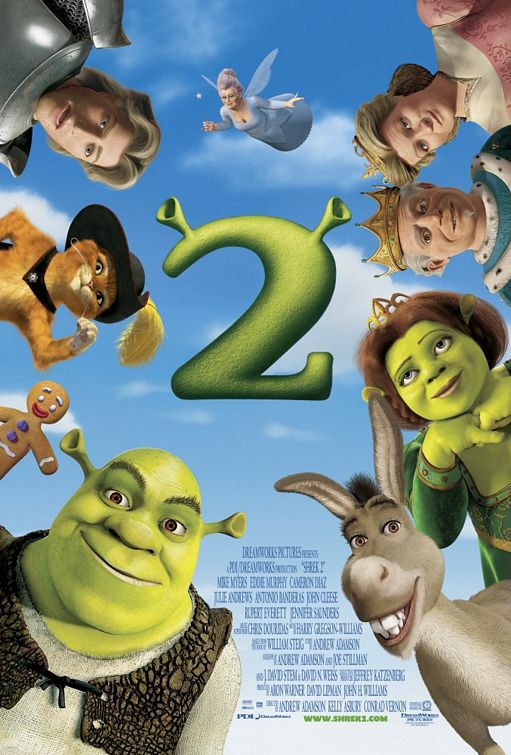 Tim here. Cannes is in the air, and as we do, I’ve been thinking about festivals past, when I landed on the fact that this very day is the tenth anniversary of the premier of Shrek 2 on the Croissette. And just as I started writing up a whole thing about big English-language crowdpleasers and their history of opening up the festival, talking about the toxic reception that Grace of Monaco has received in that slot (as so many of them do), when I landed on the further fact that Shrek 2 wasn’t that year’s opening night film (Almodóvar’s Bad Education was). No sir, Shrek 2 was an official selection in that year’s main competition. Which feels genuinely insane – no other American animated film, to my knowledge, has ever competed at Cannes, so how would something as unapologetically commercial as Shrek 2 get the nod? And yet it did, and somehow managed to receive not a single award from Quentin Tarantino’s jury.
Tim here. Cannes is in the air, and as we do, I’ve been thinking about festivals past, when I landed on the fact that this very day is the tenth anniversary of the premier of Shrek 2 on the Croissette. And just as I started writing up a whole thing about big English-language crowdpleasers and their history of opening up the festival, talking about the toxic reception that Grace of Monaco has received in that slot (as so many of them do), when I landed on the further fact that Shrek 2 wasn’t that year’s opening night film (Almodóvar’s Bad Education was). No sir, Shrek 2 was an official selection in that year’s main competition. Which feels genuinely insane – no other American animated film, to my knowledge, has ever competed at Cannes, so how would something as unapologetically commercial as Shrek 2 get the nod? And yet it did, and somehow managed to receive not a single award from Quentin Tarantino’s jury.
Anyway, the date serves more generally as an ideal moment to look back from across the intervening decade at what remains the highest-grossing animated feature in U.S. box office history – neither the Zeitgeist explosion of Frozen (with nine years of inflation to help it) nor multiple releases of The Lion King were even been able to seriously threaten its crown – and one whose massive success caused it to influence so much of mainstream animation over the intervening years.

It solidified a model that DreamWorks Animation has largely followed in nearly all of its subsequent films (though if How to Train Your Dragon 2 is a massive hit, I wouldn’t be surprised if things started to dramatically shift): not just the wall-to-wall celebrity voice cast, which was already a thing in the 1990s, but the willful anachronism with pop culture references and pop songs and a general sense that the screenwriters were spending a little too much time watching E! while they were working. (Shrek had its Smash Mouth and all, but it pales in comparison to the full-on parody of Los Angeles introduced in the sequel). And not just DreamWorks: pretty much every animation studio that isn’t owned by Disney plays around in basically the same sandbox.
So how, ten years later, does Shrek 2 hold up? Not as badly as the naysayers back in ’04 – I was one of them, and have continued to be ever since – would have predicted. Beyond a shadow of a doubt, the topical references have gone from feeling at least moderately sassy to absolutely desiccated (did you remember that there’s an O.J. Simpson joke? There absolutely is, and it was already years past its sell-by date when the movie was new), but there’s less of it than them seemed like at the time, and much of what’s there is tied to fairly obvious movies and television that hasn’t really faded from the general consciousness.
What has aged terribly, and this was also something that wasn’t terribly difficult to predict in ’04, is the animation and design of the thing: it wouldn’t be until years later that DreamWorks solved human figures, and at the time of Shrek 2 they were still in their technological infancy. Gaze on the eerily rectangular, plastic-skinned, dead-eyed monstrosities the film tries to sell as living beings, and despair:

And that’s saving you the agony of looking at the creatures in motion. It’s really horrible, though it wasn’t state of the art back then, either (until Dragon came along, DreamWorks could be reliably counted on to lag about 3-5 years behind Pixar in terms of raw animation quality). Still, looking not great by 2004 standards means looking positively ancient and dead by 2014 standards, and even if Shrek 2 had the most sparkling, living script ever to grace an animated feature, the stiff, unyielding quality of the animation itself would make it hard to watch these days.
Still and all, I found myself weirdly forgiving of the movie. I’ve never liked it – the first Shrek is the only one in the franchise that I could ever tolerate even slightly – but so fully divorced from its moment in the sun, its sub-par technology and sunny conviction that celebrity parodies and riffs on new movies was the way forward for the animated feature make it feel oddly quaint and charmingly sad, like an idiot child that’s very proud of getting a C+. If nothing else, it serves as a grim-faced reminder that everything we currently think is the most amazing and exciting thing going will age into the past, and none of us can really say what will be beloved or forgotten by future generations.

Has anyone out there thought of Shrek 2 since, like, 2005? Do you find that it holds up at all? Tell us in the comments!